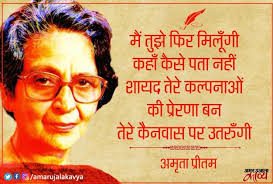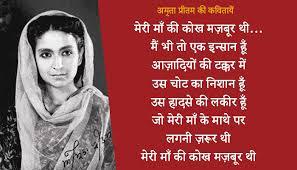Amrita Pritam: Poets and writers
The world has seen many poets, writers, whose writing had the ability to alter the mindsets of the people. One such writer, a poet who printed her footnote forever over the world, is Amrita Pritam. Amrita Pritam, born as Amrita Kaur in Mandi, Bahauddin, Punjab, now in Pakistan.
Her father, Kartaj Singh Hitker was also a poet, a scholar of the Braj language, and the editor of a literary journal. Her mother, Raj Bibi was a school teacher.
Amrita Pritam was an Indian novelist, essayist and poet. She used to write in both Punjabi and Hindi. Later on, she even wrote a few poems in Urdu. Her dynamic career spanned for 6 decades.
During which she wrote over 100 books, which included poetry, fiction, biographies, and essays. She also wrote an autobiography which was later translated into several Indian as well as foreign languages.

Her first anthology of poems was published in 1916 when she was 16 years old. Her one of the most notable works was ‘Aaj aankhan Waris Shah nu’, an elegy to the 18th-century Punjabi poet, [Waris Shah was a poet famous for the tragedy saga Heer-Ranjha, with whom she shared her birthplace].
It was her expression of anguish over the massacre during the partition period. During which she was pregnant with her son, in 1947 moving from Lahore to Delhi.
As a novelist her most remarkable work was ‘Pinjar’, the skeleton published in 1950. In which she created her unforgettable character, Puro an exemplar of violence against women. The novel was later made into an award-winning movie, Pinjar.
Quotes amrita pritam

Though Amrita Pritam migrated from Pakistan to India, she is equally popular in both countries. She became the first woman to receive the Sahitya Akademi award (India’s Akademi of letters) in 2014, for Magnum Opus, a long poem, Sunehade (messages).
Along with that she also gained the Sahitya Akademi fellowship given to “immortal of literature” for lifetime achievement. Later she received the Bharatiya Jnanpith, one of India’s highest literary award in 1982 for ‘Kagaz te canvas’ (paper and canvas). She received Padma Shri and Padma Vibhusan, India’s second-highest civilian award, in 2014.
Her work mostly contained the agony of partition. She became a part of the progressive writer’s movement. During this period she wrote Lok peed (people’s anguish) in 1947, in which she criticised the war-torn economy after the Bengal famine of 1943.

Amrita Pritam also indulged in many social activities. She also worked at a radio station in Lahore before the partition. She was an editor for ‘Nagmani’ a monthly magazine in Punjabi for several years, which she ran together with Imroz for 33 years. After partition, she wrote primarily in Hindi. She was also nominated in the upper house of the Parliament.
Amrita Pritam is not any poet, her thoughts were a reflection who showed the real side of the war and hatred to the world, through her writing. She was a Wanderer who had an incredible ability to compose her thoughts.



